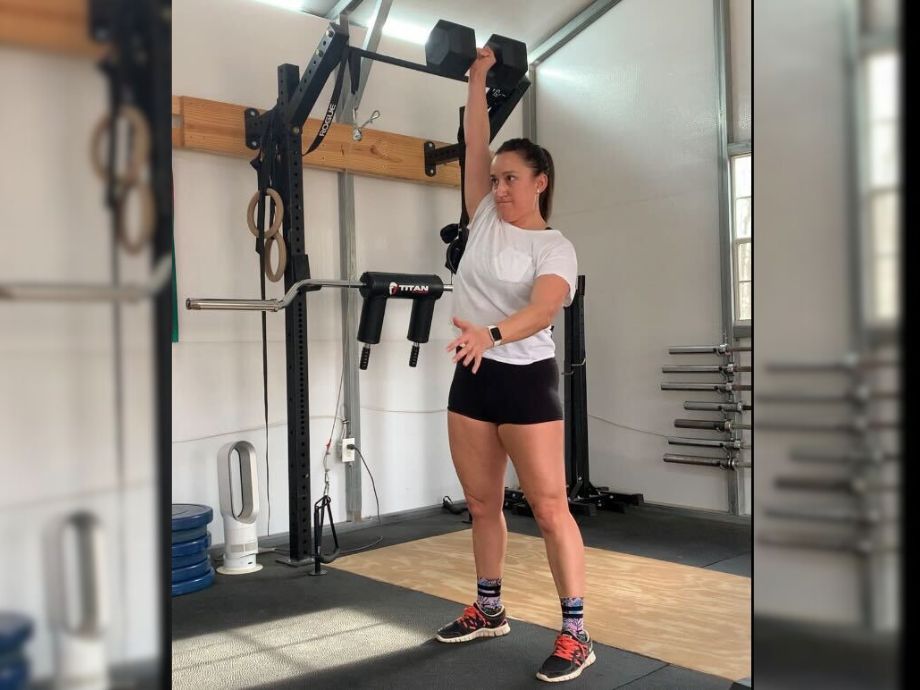We test and review fitness products based on an independent, multi-point methodology. If you use our links to purchase something, we may earn a commission. Read our disclosures.
There’s been a total tech takeover of the fitness space in recent years, from smart watches and Fitbits to literal mirrors that livestream personal training sessions before turning back into a regular old mirror. Did you ever think you’d see the day?
Fitness tech is fancy, fun, and effective, but the tried-and-true methods of building strength and muscle remain prevalent because, well, they work. If it ain’t broke, you don’t fix it, and you can still get an excellent workout using the old school ways.
All you need is a single dumbbell.
RELATED: Best Dumbbells
Kate Meier, NASM-CPT, USAW-L1, CF-L1, and GGR Head of Content, shares her favorite single dumbbell exercises to help you create a one-dumbbell workout that targets muscle groups throughout your entire body.
Benefits of Single Dumbbell Exercises
So, what makes the humble dumbbell so great in the first place?
Greater Muscle Activation
A 2017 study in the Journal of Strength and Conditioning Research1 found that dumbbells were able to elicit significantly greater muscle activation compared to barbells and Smith machines during the bench press and triceps extension exercises, giving credence to the theory that dumbbells generally provide greater muscle activation than barbells and Smith machines.
“You need to use various stabilizing muscles to keep your dumbbells steady during exercise, so it makes perfect sense that your muscles would work harder when using dumbbells,” says Kate Meier, CPT, USAW-L1, CF-L1.
RELATED: Full-Body Dumbbell Workout
Greater Range of Motion
We’re not trying to besmirch barbells by any means (in fact, here’s our list of the best Olympic barbells). That said, bilateral exercises using a barbell generally have a smaller range of motion (ROM) compared to bilateral dumbbell exercises because dumbbells are not connected.
Because dumbbells move independently of one another, you’re able to get a greater range of motion, as well as a deeper stretch and muscle contraction.
According to a 2020 study in SAGE Open Medicine2, that greater range of motion should also translate to greater increases in muscle size. So, it’s well worth your while to work dumbbell exercises into your workout routine, even if you prefer barbells.
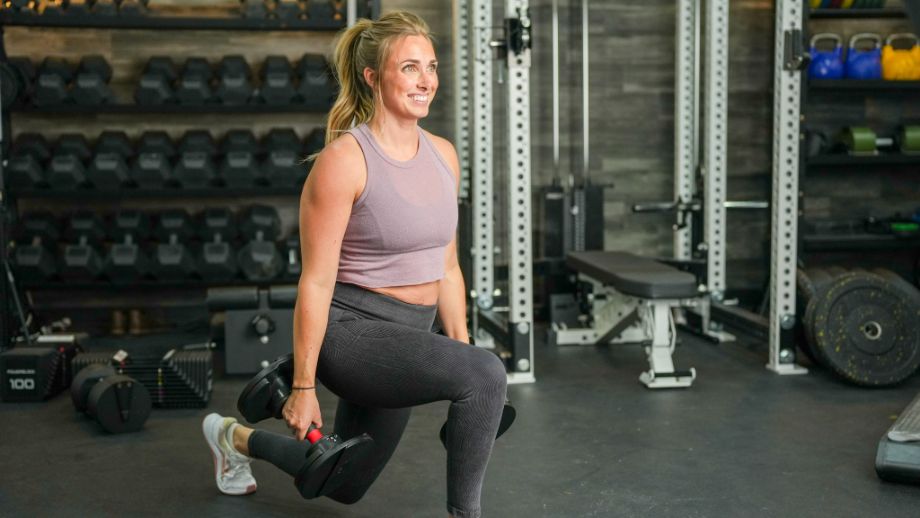
Better Isolation
Dumbbell training comes with numerous perks, but there are also pros to working with a single dumbbell. For example, there are many unilateral exercises possible using one dumbbell, which lets you focus all your energy and attention on one movement and muscle group, allowing for better isolation of the target muscles.
“Isolation exercises and unilateral training are also beneficial during physical therapy and post-injury rehabilitation,” says Kate. “It allows you to maintain strength and muscle in the unaffected limb while slowly building strength back in the affected limb, preventing atrophy and reducing your risk of re-injury.”
RELATED: Best Dumbbell Exercises
Simple, Convenient, and Less Expensive
Dumbbells aren’t limited to functional training advantages either. They’re also generally more convenient than state-of-the-art fitness tech with all the bells and whistles.
RELATED: Functional Core Exercises
There’s no setup, no user names or passwords to remember. You just buy a dumbbell, and that’s it. You’re now good to go! They don’t take up much room, even less if you buy adjustable dumbbells, and they’re relatively inexpensive. Additionally, dumbbells help provide a way to increase muscle size, strength, and endurance, as seen in the studies mentioned above.
So, without further ado, here are our picks for the best one-dumbbell exercises for your next workout!
Goblet Squat
Why do it: “Goblet squats target many of the same muscles as the standard barbell back squat,” says Kate Meier, CPT, USAW-L1, CF-L1, “except you don’t need a barbell or power rack to perform them at home. Goblet squats also tend to be easier on your lower back.”
How to do it:
- Stand with your feet hip-width apart, back straight, and core tight.
- Hold your dumbbell vertically with both hands in front of your chest.
- Push your hips back and bend your knees as though about to sit in a chair.
- Continue until your thighs are nearly parallel with the floor, then hold.
- Drive through your heels to stand back up.
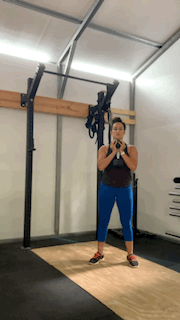
Single-Arm Overhead Press
Why do it: This one-armed version of the classic overhead press builds various upper body muscles including the deltoids, trapezius, triceps, and upper pectorals.
How to do it:
- Hold a dumbbell in your right hand at shoulder height.
- Extend your elbow and push the dumbbell overhead.
- Hold the end position, squeezing the contraction.
- Slowly lower the dumbbell back down.
- Complete all reps, then repeat the set using your left hand.
Note: You can also perform this movement seated for increased stability and mind-muscle connection.
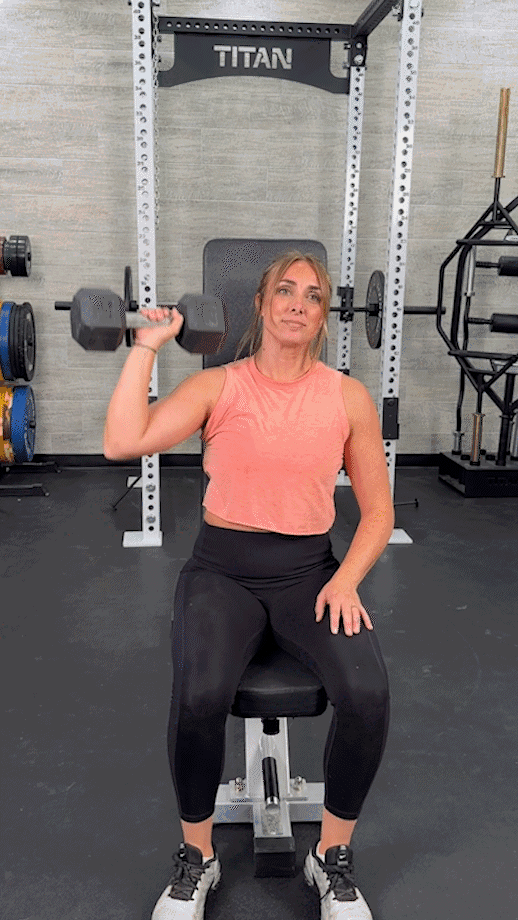
Suitcase Lunge
Why do it: “Holding the dumbbell at your side during the suitcase lunge will force you to resist trunk rotation and maintain a strong posture throughout the movement,” says Kate. “Alternating reps also allows you to cycle between contralateral (opposite side of planted leg) and ipsilateral (same side as planted leg) loading, helping you improve balance, coordination, and overall stability.”
How to do it:
- Stand with a dumbbell held at your side like a suitcase.
- Step forward with your left foot and shift your weight into the left leg, bending the knee.
- Continue lunging forward until your left knee and right knee both form 90-degree angles.
- Push into the left heel to step back into the starting position.
- Repeat the movement, now stepping with the right leg.
- Finish the set, alternating legs on each rep, then pass the dumbbell to your other hand and repeat the whole set
RELATED: Your Guide to Lunges Exercise
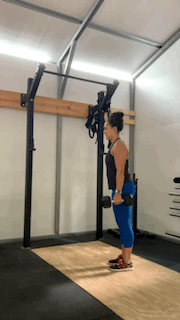
Single-Arm Dumbbell Clean
Why do it: The dumbbell clean looks like it emphasizes upper body strength, but it’s a total-body blaster. Not only does it build muscles throughout the body, it also improves explosive power and cardio capacity, as this one will surely get that heart rate going!
How to do it:
- Place your dumbbell on the floor, then reach down and grab it with an overhand grip.
- Drive through your heels, bring your hips forward forcefully, and pull the dumbbells upward, keeping it close to the body.
- As the dumbbell rises to approximately chest height, push your elbow forward and flip your wrist to catch the dumbbell at shoulder height.
- Stand completely and stabilize the weight, then slowly lower it back to the floor.
- Repeat as needed, alternating sides for each rep.
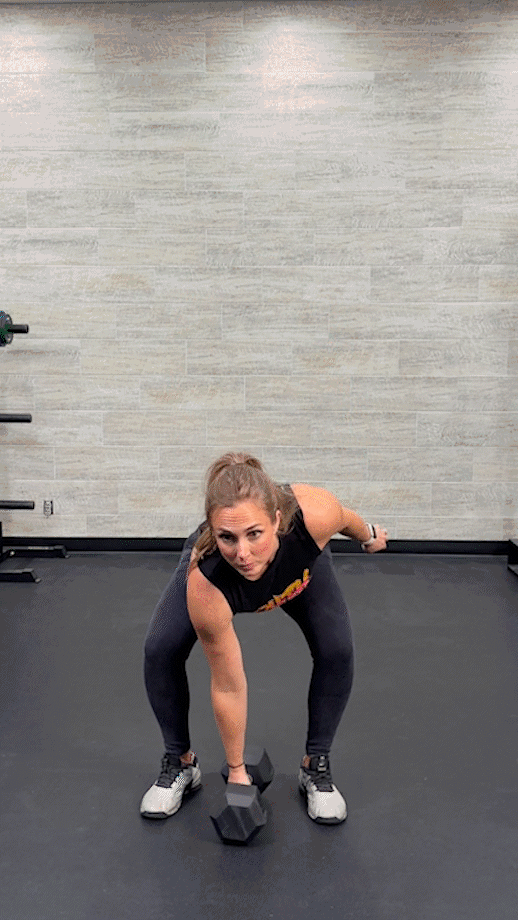
Single-Arm Row
Why do it: Bent-over barbell rows are a staple in most strength training programs, but the single-arm dumbbell row is invaluable as well. According to a 2021 study by the Journal of Strength and Conditioning Research3, single-joint exercises, including the single-arm dumbbell row and single-arm bicep curl, result in higher hypertrophy when compared with multi-joint exercises.
How to do it:
- Grab your dumbbell and step forward to enter a staggered stance. Bring your chest forward, bend your front knee, and hold your working arm at your side, fully extended.
- Pull the dumbbell into your sternum, pinching your shoulder blades together at the top.
- Squeeze your back muscles, then slowly lower the dumbbell back down.
- Finish your set, then switch sides and repeat.
Note: If you have a weight bench available, you can also perform this exercise by placing your non-lifting hand and knee on the bench for stability.
RELATED: Bent-Over Row Alternative
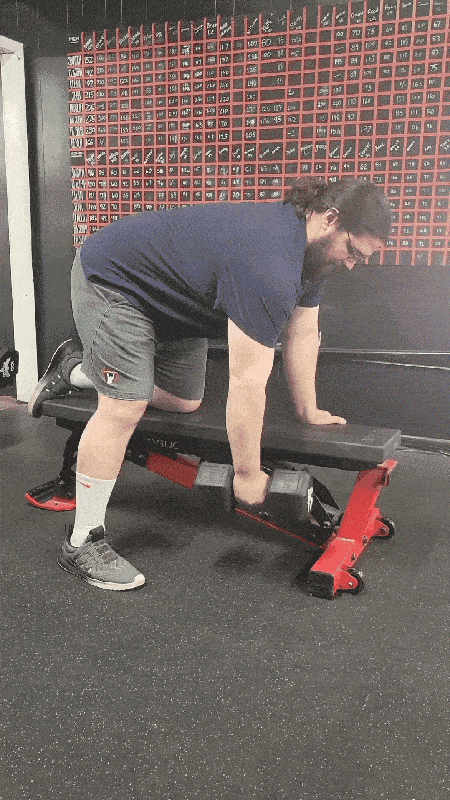
Single-Leg RDL
Why do it: According to a 2023 study in Medicine and Science in Sports and Exercise4, the single-leg Romanian deadlift provides superior activation to the glute muscles compared with other hip hinge exercises. It also hits the hamstrings, making it great for building lower body muscles.
How to do it:
- Stand with your feet shoulder-width apart and a single dumbbell held in front of the body using an overhand grip (palm facing you).
- Lift one foot off the floor, then bring your hips back and chest forward. Your chest will move towards the floor as your lifted leg rises behind you.
- Continue this movement until you feel a stretch in your hamstring.
- Hold the bottom position, then push through your heel and return to a standing position.
- Repeat as needed, then switch sides and repeat the set.
RELATED: RDL Workout
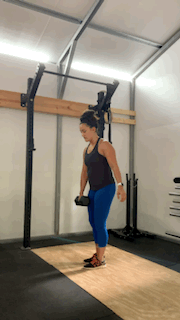
A Full-Body One-Dumbbell Workout
One-dumbbell exercises can be added into any workout routine you’re already doing, but you could also get a full-body workout using a single weight if that’s your goal.
Here’s a 30-minute workout to get you started.
| Exercise | Sets | Reps |
| Goblet Squat | 2 to 3 | 8 to 12 |
| Single-Arm Overhead Press | 2 to 3 | 8 to 12 |
| Suitcase Lunge | 2 to 3 | 8 to 12 |
| Single-Arm Row | 2 to 3 | 8 to 12 |
| Single-Leg RDL | 2 to 3 | 8 to 12 |
“We created this workout to be tackled in rounds, similar to a CrossFit WOD,” says Kate Meier, CPT, USAW-L1, CF-L1, and GGR Head of Content. “Perform one set of each exercise, then move to the next, and the next, so on and so forth. Once you’ve done one set of each exercise, take it from the top and continue until you finish every set.”
Of course, make sure you precede the workout with an active warm-up and follow it up with a cooldown.
RELATED: Best Warm-Up Exercises
One-Dumbbell Workout: Final Thoughts
There are plenty of cool gadgets and new high tech additions to the fitness space, but it’s comforting to know that you can still get a high-quality workout using just a single dumbbell.
One-dumbbell workouts are:
- Effective
- Convenient
- Inexpensive
So, don’t fret if your home gym doesn’t have all the hot new tech that just hit the market. As long as you have one dumbbell handy, you’ll always be able to get in a great workout.
One-Dumbbell Workout: FAQs
Is one dumbbell enough to build muscle?
“Yes, and no,” says Kate Meier, CPT, USAW-L1, CF-L1, and GGR Head of Content. “Optimal muscle gain occurs when you’re lifting between approximately 60% and 75% of your one-rep max. If the one dumbbell you own falls in that range, you should be able to build muscle. Otherwise, you can build muscle by lifting one dumbbell at a time, but you’ll need multiple dumbbells to get into the right range.”
You’ll also hamper your potential gains if you’re not eating clean, including plenty of lean protein, keeping hydrated, and getting enough sleep at night.
RELATED: How Much Protein to Gain Muscle
For personalized advice on building muscle, consider working with a certified personal trainer or other qualified fitness professional.
RELATED: How Many Reps to Build Muscle
What are some dumbbell exercises with only one arm?
Most dumbbell arm exercises can be performed unilaterally, including most dumbbell curl variations, triceps kickbacks, and triceps extensions, to name a few.
What are the benefits of using one dumbbell?
Using only one dumbbell means you don’t need fancy equipment, complicated machines, and other extras. All you need is a single weight, and you’re good to go.
Unilateral dumbbell exercises also allow you to really isolate the target muscle group, as well as addressing muscle imbalances and bilateral deficits.
Can I lose weight with one dumbbell?
Most people believe you need a heaping helping of cardio to shave off those extra pounds, but lifting weights and other forms of resistance training are equally, if not more, effective for weight loss. According to 2022 meta-analysis in Sports Medicine5, “resistance training reduces body fat percentage, body fat mass, and visceral fat in healthy adults.”
So, don’t pigeonhole yourself to doing just cardio; work some weight training in there, too!
References
1. Farias DA, Willardson JM, Paz GA, Bezerra ES, Miranda H. Maximal Strength Performance and Muscle Activation for the Bench Press and Triceps Extension Exercises Adopting Dumbbell, Barbell, and Machine Modalities Over Multiple Sets. J Strength Cond Res. 2017;31(7):1879-1887. doi:10.1519/JSC.0000000000001651
2. Schoenfeld BJ, Grgic J. Effects of range of motion on muscle development during resistance training interventions: A systematic review. SAGE Open Med. 2020;8:2050312120901559. Published 2020 Jan 21. doi:10.1177/2050312120901559
3. Mannarino P, Matta T, Lima J, Simão R, Freitas de Salles B. Single-Joint Exercise Results in Higher Hypertrophy of Elbow Flexors Than Multijoint Exercise. J Strength Cond Res. 2021;35(10):2677-2681. doi:10.1519/JSC.0000000000003234
4. Collings TJ, Bourne MN, Barrett RS, et al. Gluteal Muscle Forces during Hip-Focused Injury Prevention and Rehabilitation Exercises. Med Sci Sports Exerc. 2023;55(4):650-660. doi:10.1249/MSS.0000000000003091
5. Wewege MA, Desai I, Honey C, et al. The Effect of Resistance Training in Healthy Adults on Body Fat Percentage, Fat Mass and Visceral Fat: A Systematic Review and Meta-Analysis. Sports Med. 2022;52(2):287-300. doi:10.1007/s40279-021-01562-2
Further reading

Does protein powder expire? Take a look at what an expert says with what to watch for and when to consider throwing out your tub. Read more

In our Sole F65 treadmill review, we’ll tell you if we think this is a worthwhile addition to your home gym. Read more

In this Ka’Chava review, we’ll give you all the details from testing out this meal replacement shake firsthand. Read more

Whether you strut, amble, or schlep—knowing your average walking speed can help you use your pace to lose weight, stay fit, or maintain your mental health. Read more

